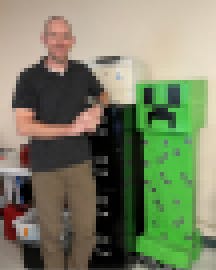Around this time four years ago, a seismic event was rippling across education.
In April 2020, teachers were beginning to realize that their schools’ closures would not be all that temporary. They’d need to make do with haphazard plans for distance learning through the end of the school year — perhaps longer.
For most educators, the pandemic was a defining moment in their careers, a situation more disruptive than they could’ve imagined.
For first-year teachers, it was baptism by fire.
In summer 2020, EdSurge profiled nine first-year teachers to understand what it was like for them to launch their careers during the pandemic year (2019-20).
Now, all of them are (or would be) in their fifth year in the classroom — a year by which about 44 percent of educators have left the profession. We checked in with them this month to see how they’re doing, what they’re up to and where they are now.
Five of the original nine responded to our queries. Of those five, one left teaching during her third year, and another will resign next month, at the end of the school year. The other three are still teaching and plan to continue.
EdSurge asked them to share about the challenges, rewards and lessons from their first five years — and, if they left, to elaborate on what drove them out. Their written responses are below, lightly edited for clarity and brevity.
Read the original story, from August 2020, here. Or listen to some of the teachers reflect on their first year during an episode of the EdSurge Podcast.
Age: 28
Location: East Rutherford, New Jersey
Status: Still teaching
Starting salary: ~$65,000
Current salary: ~$70,000
Can you give a brief overview of what you’ve taught over the past five years?
I spent the first 3.5 years of my career at Weehawken High School, where I taught Algebra I (students in grades seven to nine) and AP Calculus (grades 11-12). For the past 1.5 years, I have been teaching Algebra I and geometry for grades nine and 10 at Becton Regional High School.
What has been the most challenging and rewarding part of your job?
The most challenging part has definitely been trying to keep students engaged in the classroom and interested in their learning. It’s hard to teach math, period. But to compete with TikTok, social media and talking to their friends makes it that much more difficult.
The most rewarding part has been to get to know the kids on a more personal level, whether by incorporating occasional community-building activities in the classroom, or through the privilege of being their coach outside of the classroom. In addition, being able to learn from — and form friendships with — colleagues has been rewarding.
What has been the most surprising part of your teaching experience so far?
Just simply how difficult and demanding the job is. I normally walk more than 10,000 steps during school hours and am always exhausted by the end of the school day. Sometimes I just need a few minutes in my car to decompress before I run errands, go home and do more work. You always try to tell yourself, “It’s only a job,” and not work outside of contract hours, but teaching is so much more than a job. It’s a passion.
How do you think starting your career during the height of COVID-19 shaped your teaching experience and approach?
It showed me how, before any of the items in the job description and responsibilities [related to] teaching them math, that my No. 1 goal is to build relationships with students. You never know what any student is tackling. Coming to your class or seeing you in the hallway might be the highlight of their day!

Age: 28
Location: Lorena, Texas
Status: Still teaching, but leaving at the end of this school year
Starting salary: ~$40,000
Current salary: ~$48,000
Can you give a brief overview of what you’ve taught over the past five years?
I have been in the same school (and same classroom!) since I first started. However, my roles and responsibilities have shifted. I started out teaching seventh grade math and did that for three years. Being in a small school, they needed help taking on extra elective sections, so I also started teaching eighth grade art in my fourth year. Finally, this year, I’ve added sixth grade math, so now I have a hand in all three grade levels at our middle school.
What has been the most challenging and rewarding part of your job?
The most challenging part of my job has been “all the other stuff” that comes with teaching. I teach math and art, but I also teach kids how to disagree in a healthy way, how to handle stress, how to communicate effectively, how to read and write, how to engage in the world we live in and how to manage social media. No one tells you that when you become a teacher, your role encompasses so much. We are with these students for eight hours every day, and the influence and opportunity we have is incredible, but also really hard, especially coming out of the pandemic. We aren’t trained to be professional counselors, but a lot of times this role (and many others) are thrust upon us because we are available and we care. I think this is also what leads to teacher burnout. We do so much more than our job descriptions and do not necessarily get the compensation or training we need to do it all.
The most rewarding part of my job has always been relationships — with students and with coworkers. Teaching is 100 percent a people profession, and it has been a joy to interact daily with so many wonderful humans, to see each individual grow and change and go through different life stages — good and bad. To have a tight-knit community like this has been very impactful for me.
How do you think starting your career during the height of COVID-19 shaped your teaching experience and approach?
In my five years, I had a hard time figuring out what “normal” was supposed to be in teaching. From a year cut short by COVID-19, to a hybrid year, to a year where we pretended nothing had happened — every year was a rollercoaster and vastly different from the previous one.
On the bright side, my teaching approach became one of adaptability and resilience. I had to constantly ask myself: What really matters? Is it that the student can tell me what lateral surface area is, or is it that a student who has a family member with autoimmune disease feels safe at school every day? It was not always such a dramatic dichotomy, but I think many can relate to this idea of survival. We taught what we could, we emphasized the content and skills that would last, but we also just made sure everyone was safe, healthy and getting what they individually needed. This shifted my perspective and helped me remember that, just as we try to individualize instruction, we also remember that every student (and teacher) is going through something different and needs both grace and accountability.
I think teaching these past five years has made me more empathetic and reminded me that isolated classrooms [existing] in a school bubble aren’t realistic. The students I see daily are responding to society and the events in our world and will one day have a huge impact as its future citizens. I hope in a similar manner, my impact extends beyond [sharpening] mathematical understanding to [supporting students in] how to be productive, kind, discerning humans in our world.
Wong Baesa is resigning at the end of the school year to pursue a career outside of K-12 education. While she says she still fully believes in the importance of educating the future generation, she hopes to be able to do so outside of a classroom setting.

Age: 29
Location: Oklahoma
Status: Left teaching in year three
Sadly, I left the classroom after the first quarter of the 2021-22 school year after teaching for just over two years. There were many factors that contributed to that decision.
On the practical side, I spent a great deal of effort on personal financial discipline during the first two years of my career and found success in attaining the short-term financial goal I had set for myself (saving up a six-month emergency fund). I also bought my first car, with $2,500 cash. So in year three of teaching, when I started thinking about my long-term goals and ran some financial planning calculations based on Oklahoma’s pay-rate at the time, I found that even if I saved 33 percent of my income, between student loans and saving for retirement (because the compensation from the Teachers’ Retirement System of Oklahoma is not actually enough to live on during retirement), it would take me nearly a decade to be able to save for a down payment on a home. Even though I told myself every day to remember, “You’re not in this for the money, you never were,” this realization was incredibly disheartening, and I don’t think I was ever really able to get over that throughout the first nine weeks of the year I resigned.
At the same time, I also continued to deal with imposter syndrome. As a new teacher, I constantly felt inadequate, unable to accomplish the feats my veteran coworkers seemed to be completing with ease. I was always wondering when everyone — my principal, my students, their parents, my fellow teachers — would realize that I didn’t belong there. These feelings were complicated by the fact that I was actually able to build amazing relationships with everyone in that list. Parents were lavishing me with gifts, words of gratitude and encouragement throughout the year. Students would write me notes telling me how much they loved having me as their teacher. Right before I resigned, my principal had even given me the most positive evaluation I had received since I started. She practically raved about how much I had improved in every area and how much potential she knew I still had to excel even further with time and patience.
But none of that was enough. I knew I couldn’t sustain the level of success and productivity that she was depending on, or that my students needed. I had increasingly severe anxiety attacks throughout the first nine weeks of my third year of teaching. Some small thing would fall through the cracks, and I would experience symptoms such as shortness of breath for hours on end, a lump in my throat, being on the verge of tears, headaches and blurred vision. On the day that one of these attacks lasted the entire eight-hour school day, I finally opened up to my dearly beloved mentor teacher down the hall about all of these things. As I drove home after sharing with her, I knew it was time for me to step away.
I experimented with a few other career paths before I became a district executive for the Boy Scouts of America in September 2022. When this job found me, I knew it was an incredible opportunity to participate in an organization that precisely aligned with my passion. I know that I was created to contribute to helping children and families in my community flourish. This is exactly what I get to pour myself into when I wake up each morning in this current role.
Age: 30
Location: Petaluma, California
Status: Still teaching
Starting salary: ~$46,000
Current salary: ~$83,000
Can you give a brief overview of what you’ve taught over the past five years?
I have taught the same grade, transitional kindergarten (TK), since I started teaching, but I have moved schools twice. In the 2021-22 school year, I moved to an elementary school in Santa Rosa, California. It was a significant raise in pay, but a 30-minute commute. That school has a lot of strengths and I learned a lot, but it had its flaws and complications as well. Long story short, I left. I almost stopped teaching.
Then, I got my dream job at Sonoma Mountain Charter. It is a wonderful school with a wonderful staff. It is close to my house, and I have the privilege of working with my mom, who is one of the school counselors in the district. It is an arts charter school, and there are a lot of ways teachers and students participate in the arts. Students learn to play instruments, participate in plays and engage in an amazing art adventure week, in which students are placed in mixed-age cohorts, and work on art projects together. As an artist myself, it is so nice to get to use my art degree so much in my professional life.
What has been the most challenging and rewarding part of your job?
One of the challenges I faced was with varying opinions over COVID protocols. My mom has cancer and my husband has asthma, so COVID could have been very serious for either of them; as a result my husband and I were incredibly careful. That part is still hard. I wear a mask to this day. At one point, I decided I was not going to wear a mask, and seven days later, I got COVID for the first time. So I went back to masking.
The most rewarding part of teaching is the ability to help shape the future. It is a big responsibility that I take very seriously. I try to teach using multicultural materials. I teach about gender inequality and how to be kind, empathetic and accepting. Setting the foundation for most more advanced skills is amazing. A huge part of teaching littles is helping them develop a love of learning. I have to tell my students that we can’t read words on the board anymore because it is time for recess, and they beg me to continue reading. They LOVE asking questions and discovering new things. It is really amazing and truly fun!
What has been the most surprising part of your teaching experience so far?
When we returned to school in March 2021 … I had a third of my class in person in the morning, another third of my class online at the same time, then the last third in person in the afternoon. [I was surprised by] how different the kids were from how they were at home [on Zoom], as well as some of the parenting choices that we were experiencing. It was hard to get a hold of parents, and we had to tell parents to put pants on and not swear while their kids were Zooming.
How do you think starting your career during the height of COVID-19 shaped your teaching experience and approach?
I think that starting my career at the height of COVID shaped my teaching experience in a lot of different ways. We were asked to do so much. I had 28 students, and I taught a class that combined TK and kindergarten students. I was in graduate school. I was planning my wedding (which was ultimately postponed). My mom was in treatment. My 1713866447 husband wasn’t working. It was an extremely stressful time, and then we went on an extended spring break and never came back that year. I remember driving around to my students’ houses at the end of the year just to say goodbye from a distance.
Teaching has gotten so much easier, which is normal, especially if you stay in the same grade. But it’s also because [other parts of my life have slowed down]. I graduated with my master’s degree, so that stress was gone. And I moved schools, so I was making more money, so that stress was gone. Then we had the wedding, so that stress was gone. The vaccines came out, so at least we were a little protected. Now I don’t have a long commute, I teach in a well-paying district, and I have a great team of early childhood educators I get to work with. I get to focus on making the kids’ experience at school the best one they could possibly have.

Age: 27
Location: Hinesville, Georgia
Status: Still teaching
Salary: N/A
Can you give a brief overview of what you’ve taught over the past five years?
I have been extremely fortunate to continue teaching my favorite grade level, fourth grade, and my favorite subject, English language arts (ELA). Since starting my career, the dynamic of my department has changed a few times, so I’ve taught ELA by itself as well as ELA and social studies. Currently I am on a team of two [fourth grade teachers], so I teach ELA and social studies while my partner teaches math and science.
What has been the most challenging and rewarding part of your job?
The most challenging part of my job has been helping my students recover from the pandemic, in terms of educational progress and social-emotional development. My current fourth graders experienced “COVID learning” during their formative years of kindergarten and first grade. While they have been back to “regular school” for a few years, I can still see the social and emotional [gaps]. However, I do feel that they are making great strides.
Another challenging part of my job has been managing all that is expected of teachers inside and outside of the classroom. We wear so many hats and make so many decisions in a day. Our students, colleagues, communities and families need us to show up for them — all in different ways. Sometimes, it can get very overwhelming. Juggling being a teacher with being a full-time student has also been a very interesting feat. Since my first year teaching, I’ve earned two degrees — my master’s degree in 2020 and a specialist degree in 2022. I’m currently working toward my leadership certification and hope to begin a doctorate program soon. The balancing act is definitely a challenge, but I’m working extremely hard to achieve my personal and professional goals while continuing to enjoy the profession.
The most rewarding part of my job is, and will always be, the relationships that I build with my students. This year is definitely a full-circle moment, as I have realized that the first group of students I had when I entered the profession in 2019 is going to high school next year! Whenever I see them out and about in the community, they still talk about memories [from that year] and how I’m their favorite teacher. While teaching can be a very tough and demanding job, the children always find a way to remind me of my impact on their lives.
What has been the most surprising part of your teaching experience so far?
The most surprising part of my teaching experience thus far is the fact that being a teacher never stops. Of course, I always knew it was a full-time job. I knew that teachers spent weekends and late nights working on all of their school tasks. But I didn’t understand the reality that teaching becomes such a part of you, sometimes you can’t turn it off. I often catch myself randomly thinking about a new strategy to try or a new project to do. It surprises me that sometimes I simply just cannot turn it off.
How do you think starting your career during the height of COVID-19 shaped your teaching experience and approach?
Starting my career at the height of COVID literally altered my brain chemistry as an educator. It was as if one of the wildest things that could ever happen actually did. I learned in that first year that anything can happen, and we have to learn to adapt. We were thrown into an entirely different realm of education with no handbook. Most of us were building the plane as we were flying it, but ultimately we landed safely. That first school year showed me that teachers are capable of absolutely anything. I figured that if I could survive that, I could survive anything. The experience taught me to adapt, [helped me develop] an immense level of patience and it taught me that I could persevere through a lot.

Age: 46
Location: San Antonio, Texas
Status: Still teaching
Starting salary: ~$56,000
Current salary: ~$58,000
Can you give a brief overview of what you’ve taught over the past five years?
Over the past five years, I’ve experienced both consistency and transitions in my teaching career. I started at one public middle school where I taught digital communications, and then moved to a different one in the district, called Bush Middle School. At Bush, I teach technology applications, computer science and robotics.
What has been the most challenging and rewarding part of your job?
In the past five years, the most challenging part of my job has been dealing with unsupportive colleagues at my previous school.
The most rewarding aspect has been implementing innovative strategies in my classes, such as starting a weekly email initiative in which students send an email home to their parents/guardians every Monday with an update about their learning. In the emails, students include a screenshot of their grades across all classes, two fun or interesting things from school, and a plan to complete any missing assignments. I’ve been doing this for about three years now, and it serves a few purposes. It breaks a negative cycle where parents only hear from their child’s school when something is wrong. It empowers students to take responsibility for their learning. It promotes transparency among students, teachers and families.
The weekly email is not schoolwide yet. However, word has gotten out, and my district has asked me to give a training on it to other technology teachers in the district for next school year.
What has been the most surprising part of your teaching experience so far?
The most surprising part of my teaching experience thus far has been witnessing the incredible resilience and determination of my students. Despite any challenges they may face, they continue to push forward and demonstrate their eagerness to learn. This unwavering dedication has been both humbling and inspiring, as it serves as a constant reminder that the work I do is ultimately about the students and their growth. Their perseverance has undoubtedly played a pivotal role in motivating me as an educator.
How do you think starting your career during the height of COVID-19 shaped your teaching experience and approach?
This unprecedented situation compelled me to think outside the box, develop innovative solutions and adapt to constantly changing circumstances. It also taught me that fostering independent learning skills in students must begin at an early age. The pandemic served as a powerful reminder that, just as I cannot drink water for them when they are thirsty, I cannot absorb knowledge on their behalf — the effort to learn must come from within.

